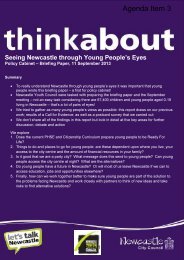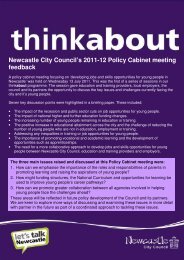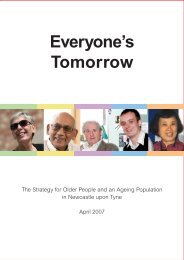NEWCASTLE'S MUSICAL HERITAGE AN INTRODUCTION By ...
NEWCASTLE'S MUSICAL HERITAGE AN INTRODUCTION By ...
NEWCASTLE'S MUSICAL HERITAGE AN INTRODUCTION By ...
You also want an ePaper? Increase the reach of your titles
YUMPU automatically turns print PDFs into web optimized ePapers that Google loves.
1890 –1915 were, Edward Lloyd, Madame Albani, Clara Butt, Andrew Black,<br />
Carrie Tubb, Gervase Elwes and Agnes Nicholls who was accompanied by her<br />
husband, Hamilton Harty. Harty, listed today as organist, pianist and conductor<br />
was one of the first conductors from the British isles to win international fame and<br />
in 1920 rescued a floundering Halle Orchestra and turned it into a first class<br />
ensemble, although at the turn of the century he was only a concert accompanist.<br />
These well-attended annual concerts took place mostly in the Town Hall and The<br />
Olympia on Northumberland Road, a general purpose hall opened in 1893.<br />
Open air band concerts where a prominent feature of Victorian and Edwardian<br />
life and continued up to the outbreak of the Second World War. Two early<br />
examples were the concerts put on by the Electrical and General Engineering<br />
Trades Industry and Art in 1897 featuring the Royal Marines Light Infantry<br />
Band that played music by Sousa, selections from Gilbert and Sullivan operas,<br />
and Wagner and in 1906, The Northern Counties Trades/Arts and Industries<br />
Exhibition in Leazes Park that went on for two months and had music performed<br />
by the String Band of the Royal Artillery every afternoon and evening. It seems<br />
odd that Newcastle City Council haggled over spending money on the People’s<br />
Concerts in the Town Hall but seemed to have no problem with allocating money<br />
for music in the parks. Many of the town’s parks had bandstands (a beautiful<br />
example is still to be seen in Exhibition Park) and on Sundays and Bank Holidays<br />
they attracted large numbers of people, who sat around on chairs or benches,<br />
dressed in their Sunday best – men in their dark serge suits with starched collar,<br />
tie and waistcoat – ladies wearing fashionable hats - enjoying the colourful<br />
spectacle of the bandsmen in their pseudo-military uniforms, and the selections<br />
they played of well known operatic airs and popular pieces of light music. From<br />
1900 until the 1930s .the Council presented Parks’ Promenade Concerts in the<br />
City’s main parks. Large format programmes provided the audience with a list<br />
from which the concert selection would be chosen.<br />
Military Band style concerts were a colourful phase in the history of music in<br />
Newcastle but appeared to go out of fashion with the Second World War.<br />
However, Brass Bands, which initially had a much lower profile and attracted less<br />
attention were an important development in the social as well as the musical<br />
history of the town. Like the Music Hall they were part of working class culture<br />
but unlike Music Hall the movement was never infiltrated and remained solid<br />
working class to the core. It grew from strength to strength over the years. Today,<br />
whilst these bands are fewer in number it is now a national movement. How it all<br />
started no one is really sure and like the Tyneside Music Hall its origins are<br />
vague. It may have been that these bands were founded as an imitation of the<br />
many army, militia or volunteer bands that were around during the period of the<br />
Napoleonic Wars, 1793 –1815. And/or they may have come about when ex<br />
military bandsmen took their musical skills home with them from the army. On the<br />
other hand, they may simply have arisen from a desire to make a sound on crude<br />
locally manufactured instruments. But what seems fairly certain is that with the<br />
introduction of valved wind instruments in the 1840s, which facilitated their<br />
70

















